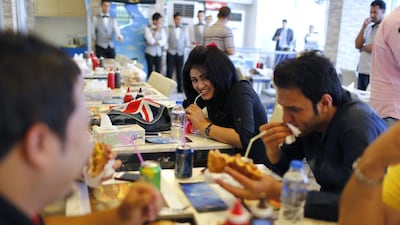In the past few days, there have been a couple of highly publicised displays of confidence in the safety and stability of the Iraqi capital. On Friday, US Marine Brigadier General Austin Renforth went on a stroll of Baghdad's most populous neighbourhoods. Then, on Sunday, the nation's president, Barham Salih, took part in celebrations of the Iraqi army's 98th anniversary in the once heavily fortified Green Zone.
As carefully planned as they might appear, these events back up conversations I have had with UAE-based business people who have visited Baghdad in recent months. All have reported that life there can now be considered increasingly normal. Many say that there is a renewed vibrancy to the city, with a growing number of residents enjoying nights out at restaurants and cafes. Given Baghdad’s reputation, all of this is encouraging and boosts hopes for a stable and prosperous future.
In the longer term, Baghdad is, according to United Nations figures, on the way to becoming a megacity. The accepted definition of a megacity is an urban settlement of more than 10 million people. Now, about 8m live in Baghdad, but it is projected that it will become home to more than 10.5m by 2035. The health of the capital is a key indicator for the broader prospects of a nation that has, up until now, failed to build up any real momentum in terms of political and economic progress.
Modern Iraq is highly urbanised, but the country also has a long history of great cities. Baghdad was founded by the Abbasid caliph Al Mansur in the 8th century as his own capital, separate from traditional regional centres of power, such as Damascus. For 500 years, it was at the centre of an Islamic golden age.
In 1258, the Mongol conqueror Hulagu Khan put paid to that, sweeping through much of western Asia and besieging Baghdad.
Sectarian divisions at court had weakened the caliph and led to the eventual fall of Baghdad. According to contemporary accounts, the Mongols did a proper job on Baghdad, performing the sacking of all sackings.
Legend has it that the Tigris ran red with blood, then black with ink from thousands of books held in the renowned Dar Al Hikma (House of Wisdom) that were looted and thrown into the waters by invading forces. The innovative irrigation networks that allowed agriculture to thrive were also not spared, which had a devastating impact on the city.
In the aftermath, the remaining residents of Baghdad picked themselves up and started again. Eventually, the city re-established itself as a bustling, cosmopolitan place, suffering trials and tribulations along the way. The country came under Ottoman rule from the 16th century until the end of the First World War, after which it fell under British administration. Independence from Britain was achieved in 1932, marking the beginning of the modern state as we know it, with Baghdad officially its capital.
When my mother talks about life in Baghdad in the 1960s and 1970s – when I was born there – she describes a cosmopolitan, progressive city. Even allowing for nostalgia and a certain amount of political tension during those decades, she paints a very different picture to the war and chaos that we have grown used to over recent decades.
Surging state revenue from the Opec oil embargo of the 1970s provided funds for world-class infrastructure and education. This made the dinar strong against foreign currencies, which, in turn, led to a growing and well-travelled middle class.
However, Iraq was being eroded from within, thanks to the corruption of the ruling Ba’ath Party and the machinations of Saddam Hussein. In the summer of 1979, Saddam manoeuvred himself into the presidency. From that point, the decline quickened against the backdrop of an eight-year war with Iran that began in 1980, swiftly followed by the 1990 invasion of Kuwait, which led to the first Gulf War.
The following years have been calamitous. But, somehow – through the Desert Storm campaign of 1991, the slow deprivation of the 1990s sanctions era, the shock and awe of the Iraq war in 2003, the recent civil war and the fight to defeat ISIS – Baghdad has managed to hold on to some of its historical cachet.
While the city now seems to be on a surer footing, it must still overturn perceptions of it as a dangerous and insecure place. Achieving this will take more than a few meticulously orchestrated photo opportunities. Altering people’s preconceived ideas about anything is always difficult, but perhaps more importantly, a thriving economy has been built around security in Iraq. A safe Baghdad would undermine this lucrative industry.
There is also the fear that the current period of relative calm is a temporary lull, while a government continues to be formed after elections held in May 2018. Many believe that once the winners and losers are decided, fighting could once again flare up between different factions.
Only one thing is for sure – that, whatever the future throws at it, Baghdad will endure. That's what it does. As the British novelist and playwright James Elroy Flecker wrote in his 1922 poetic drama The Story of Hassan of Baghdad: "We are they who come faster than fate: we are they who ride, early or late."
Mustafa Alrawi is an assistant editor-in-chief at The National


